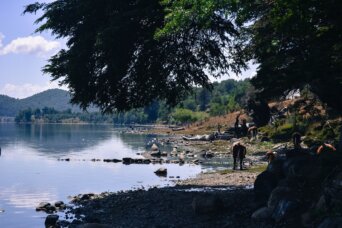- About
- Topics
- Picks
- Audio
- Story
- In-Depth
- Opinion
- News
- Donate
- Signup for our newsletterOur Editors' Best Picks.Send
Read, Debate: Engage.
| topic: | Climate Change |
|---|---|
| located: | Brazil, Argentina, Bolivia, Ecuador, Nicaragua, Uruguay, Panama, Colombia, Peru, Costa Rica |
| editor: | Ellen Nemitz |
Latin America, despite its diversity, is facing some common problems. First, the Covid-19 outbreak has arrived as a hurricane, pressuring health systems, devastating economies and exacerbating inequality – according to a report from Oxfam Brazil, billionaires from the region saw their fortunes rise more than 48 billion dollars during the pandemic, while more than 600 thousand micro, small and medium-sized businesses have closed in Brazil alone.
Also, a combination of human activities with climate change is helping forest fires get to huge dimension: Argentina is registering uncontrolled flames in Cordoba and also in Paraná Delta; Bolivia is witnessing a dangerous tendency of burning in its forests, leading the country to declare a state emergency after losing half a million hectares, according to El País; and Brazil, as reported last week, is battling against fires in several biomes: from the rain forest Amazon to the wetlands of Pantanal. From south to north, the forests that guarantee communities livelihoods and control global warming are burning.
To call for governmental protection, activists launched a hashtag in three languages: #LatinoAmericaEnLlamas, #LatinAmericaOnFire or #AmericaLatinaEmChamas, asking for the recognition of ecological debt from the global north to global south (with fair repair), protection to wetlands, forests and the rest of our ecosystems and biodiversity (stopping fires urgently), as well as the urgent recognition and protection of indigenous people, the guardians of the earth.
Last, the movement claims for the signing and ratification of Escazú Agreement. Resulting from the United Nations Conference on Sustainable Development (Rio+20), the document created two years ago in the city of Escazú, in Costa Rica, aims to gather countries around a common goal: "Guarantee the full and effective implementation in Latin America and the Caribbean of the rights of access to environmental information, public participation in the environmental decision-making process and access to justice in environmental matters.” In addition, another object is "the creation and strengthening of capacities and cooperation, contributing to the protection of the right of every person of present and future generations to live in a healthy environment and to sustainable development."
The document also provides protection for environmental defenders, whose lives are frequently threatened. The United Nations says the Escazú Agreement is “a valuable tool to seek people-centred solutions grounded in nature.”
Since 2018, the agreement has received 22 signatures and nine countries’ ratification – from Bolivia, Ecuador, Nicaragua, Uruguay and Panama, for example. The deadline for signing is September 26, but, in order to enter into force, it must be ratified by 11 nations – Brazil, Colombia, Argentina, Peru and Costa Rica, among others, have not done it until the present moment.
In this scenario, the Youth Organisation launched the Escazú Campaign, an open letter that claims the countries which have not signed or ratified it to do so, "which would signify a historical milestone in the protection and progression of Human Rights and Environmental Justice.”
Nonetheless, it is important to remember the words of the director of Amnesty International for the Americas, Erika Guevara Rosas, who stated that signing the agreement is not enough: countries must "take concrete measures to guarantee that it fulfils its ideals.”
Image by rpsidgman

